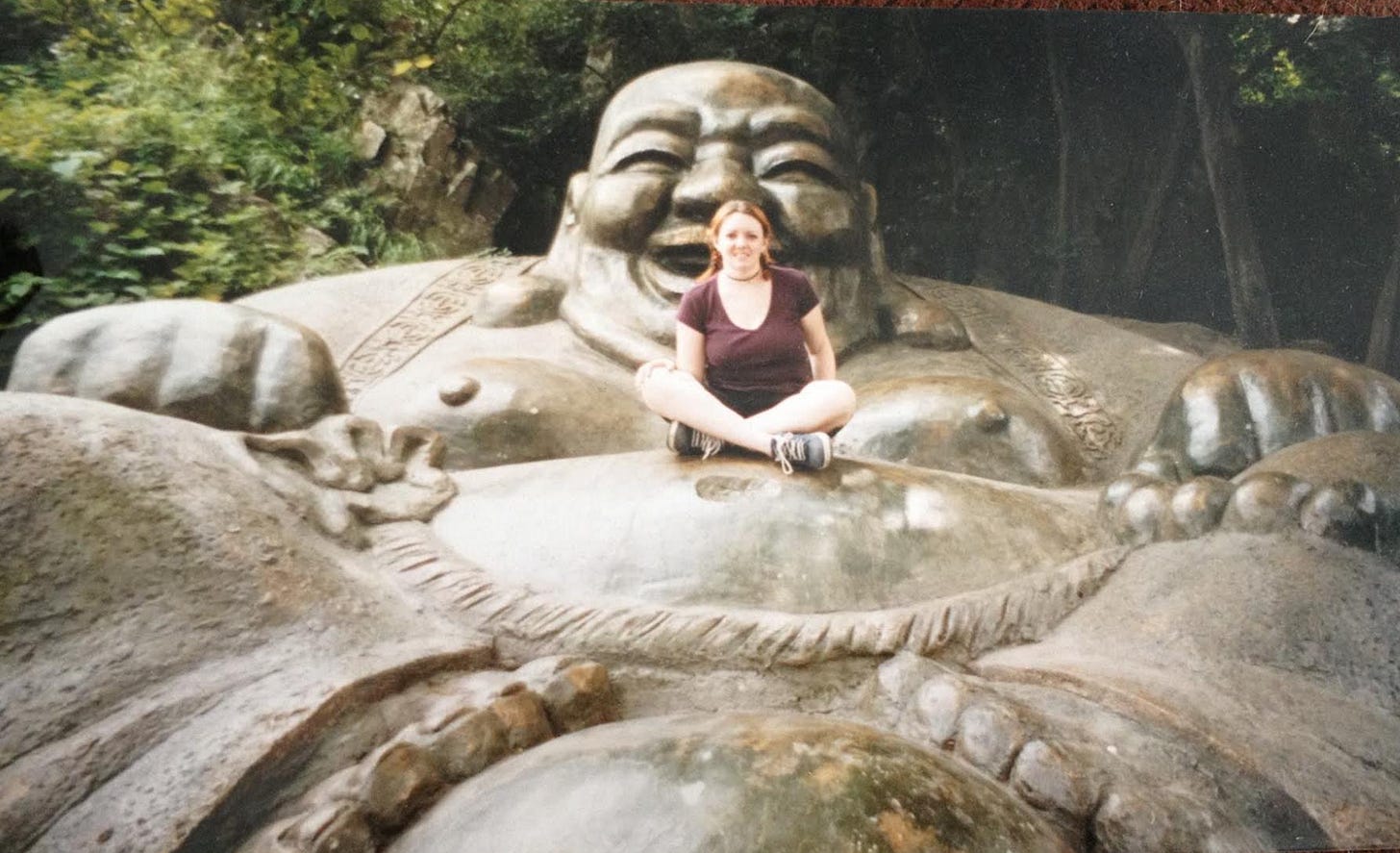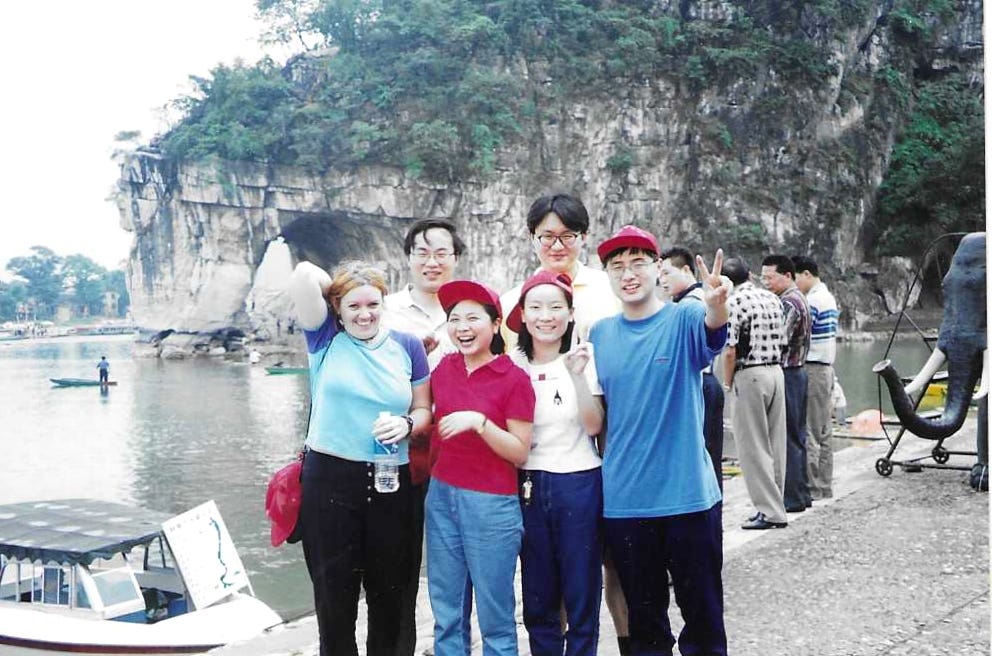China 1999 - where I fell in love with myself, new cultures and the laughing buddha
The short version #19
If you have read my “About” page you will know that my first overseas adventure as a solo adult was to China in 1999. I was in the second year of my PhD studies, just. I had to get a passport. I had to get a letter inviting me to China to enable me to get a visa. I was going for three months or 100 days as my letter states (yes, I still have it). You are kindly expected by the Chinese Academy of Sciences to come to Wuhan, China on April 20 for research. The duration in China will be 100 days. I had been overseas once before as a child in the late 70’s or early 80’s and in those days children were listed on the parent’s passport. I clearly remember getting that photo taken for a 2-week trip to Fiji. But this time was different. I was going alone. I was to meet other students at the airport when I arrived and I would be part of a group when I got there, but I was leaving the country for the first time as an adult ALONE. I was excited but anxious. I didn’t know what to expect. It was organised by my Chinese supervisor and his college friend when the friend visited Australia in the February of that year. My passport was issued on 19 March 1999. My invitation letter to get a visa was dated 24 March 1999 and on 20 April 1999 I arrived in Wuhan, China. It happened so quickly I didn’t have time to be nervous.
China was an exciting, new experience for me. I knew very little about China before being thrust headfirst into a 3-month learning adventure. Armed with nothing but a Lonely Planet guide, an 8-week course in Conversational Mandarin, a BIG suitcase full of clothes, books and science papers (I had not yet learnt how to pack lightly) and a box of Australian soils (for analysis), I was on my way to Wuhan in the People’s Republic of China. I thank my lucky stars every day that I got to travel there before 9/11, before the myriad of restrictions were placed on in-cabin items, on foreigners, and well before Covid-19. The best thing I did before I left was the short course in Mandarin. At least I understood the announcements at the airports and could say ni hao (hello) and xie xie (thank you). The two most important travel words in my opinion and words I learn for every place I visit.
I knew that we, as Westerners, had more freedoms, but I didn’t realise just how much. They were not allowed to study what they wanted. Their career path was chosen for them, based on their high school scores. My professor in China was a beautiful artist, he showed me his sketchbook when I went to his house one time for dinner. He was extremely sad that he could not do it for a living. Instead he was a scientist, because that is what he was told to do, that is what his scores said he would be good at. My fellow graduate students were mostly married and all questioned me why I was not at my ripe, old age of 25. I didn’t even have a boyfriend at that point, but that was odd to them. Imagine if they knew now that I was still unmarried, had no children and was living the dream! Being married still did not mean they could live with their husbands. They had to live where they worked. One of the girls I was friends with lived in the dormitories with me, albeit in a shared room, whereas I was privileged to have my own room. Her husband lived in a town miles away where he lived in a dormitory of his own next to the company he worked for. They only saw each other occasionally when he could visit on the weekends, even though that was technically not allowed. Her roommate would bunk in with another group of girls so they could have the room to themselves. Again, not allowed. Everyone kept it a secret, the many secrets these people kept so they could live a more free life was amazing. There was of course the one-child policy but I did not see this enforced in the villages. Many families had two children or more, especially when the first was a girl.
Wuhan was a place I loved though. I loved it because I saw a whole different way of life and being, it was an adventure I never in my wildest dreams thought I would experience. I loved the friendliness of the people I encountered, their willingness to take me places, teach me things and become my friend. I learnt their customs, jokes, personal political woes and tai chi. I loved talking to the old man who manned the gate to our dormitory building (it was locked at 10pm). He literally slept in a small, 2x2 metre wooden gatehouse. I loved that the other students in my building would bring their washing to use my washing machine (they had never seen one before I arrived) so they didn’t have to hand wash, and their husbands would cook in my kitchen (when they were allowed to visit) while we sat and read the magazines my sister sent over. I had to explain a lot of unusual English words to them, I still remember the flushed faces and crying laughter when I had to explain the word masturbation. I felt like I had friends, real friends. I loved talking to the woman at the little hole in the wall where we ate most days for breakfast, lunch and tea. She cried when I left and gave me a fan that I still have today. I loved going to English corner at Wuhan University every Wednesday evening and speaking with all the students in English, even if I did repeat myself a lot. I learnt there that I sounded more like a New Zealander than British!
I felt my soul come alive with all the new experiences, people, language and food I consumed. I learnt to love green tea and tea ceremonies, because coffee was rare. The culture and history was fascinating to me. The language even more so, the different dialects in each village. How spoken Mandarin is different to spoken Cantonese even though the characters are the same. Learning about the walls around the cities and The Great Wall of China. I never saw the Great Wall but I did walk on the wall of Nanjing. I ate their weird and wonderful food, qieza (I pronounce this as chee-er-za aka eggplant), seaweed soup, green eggs, wontons, dumplings, small snails (not the big French escargots), so many things I had never eaten before, not a fried rice or lemon chicken in sight! I realise these foods are more common in the Western world in 2024, but I had never seen a steam basket with dumplings before going to Wuhan in 1999. I loved that we got siesta in the middle of the day. Their television shows were wild, so much folklore and fantasy. I learnt a lot of language from watching daytime TV during siesta break. I discovered early Jackie Chan movies. I learnt so much I could go to the market on my own, outside the walls we lived in, and bargain for food and meat, eggs and rice. Although the prices were so cheap I sometimes felt like I was robbing them, but they loved to bargain, that was the custom. I would buy bread from a lady with a cart on the street, I would play with the kids in the street. They owned pet cats and dogs. I bought shoes and clothes at bargain basement prices. I found coffee sachets, but still walked around with my jar of boiling green tea because that was custom.
Toward the end of my trip I headed to Nanjing for a couple of weeks at the Institute of Soil Science, before heading to Shanghai for my flight home via Suzhou and a research farm just outside Suzhou. Suzhou was the city of silk and by the time I got there my language and bargaining skills were honed enough that I got some great bargains on silk items for my family. But what I loved most was the Big Laughing Buddha at Purple Mountain (Zhongshan Mountain National Park). For years I never knew where this photo was taken (thank you Google). I just knew it had been near Nanjing when one of my peers had taken me on a day trip to Dr Sun Yat-sen’s mausoleum. We had walked up the mountain instead of taking the cable cars as we decided it was good to get some fresh air and exercise. He was also a hiker, I was not. I was mesmerized when we came upon this giant statue with no one else around. I was hesitant about climbing on to the buddha at first, as I didn’t want to get in trouble or be disrespectful, but he encouraged me to climb up on it and took the photo. I think he was an atheist. I had always been fascinated by the laughing buddha as my nana had quite a few around her house. She said they brought good fortune, especially if you rubbed their bellies. I rubbed those bellies a lot! I rubbed this giant belly a lot. I have since seen many buddha’s throughout Asia, but this one remains my favourite. I have never seen another laughing buddha quite the same, or in such a place of solitude. When I look at the picture above it always reminds me of my nana and her love of the laughing buddha. I bought many smaller laughing buddhas for her that day and have learnt a lot more about Buddhism in general since then.
I also hated this trip for so many reasons. I hated it because NATO bombed the Chinese Embassy in Belgrade during the Kosovo War about 2-3 weeks after I arrived. I learnt very quickly how to say “I am Australian, not American” in Mandarin - sorry to all my American readers - this was survival mode. It allowed me to eat in restaurants again, buy food, go to the cinema again and walk the streets safely, alone. I can remember being taken out a back door of a restaurant the night it happened and molotov cocktails were flying everywhere in China. We hadn’t even finished dinner, we were still drinking one ganbei (cheers) at a time. One taxi driver refused to take me home. Another was paid a lot of money to take me directly back to the dormitories because I was outside “the wall” and I had to lie low in the backseat. It was scary to think what was happening, but it was reassuring to know these people got me home safely at their own expense. I hated it because I was a lao wai (foreigner) and felt on display. At one village I was sat in the main room of the house we stayed at and greeted by every single villager saying “hello, goodbye, ABC, 1, 2, 3” as each person shook my hand and touched my skin. They were fascinated by my whiteness. They wanted to be white like me. I hated it because I couldn’t speak with my friends or family. There were no smartphones back then, I didn’t even own a mobile phone and barely anyone had email. I wrote my mum and my sister old-fashioned letters and my sister would send me things in the mail, like CLEO and Marie Claire magazines, Tim Tam biscuits and, of course, vegemite. My mum sent me practical things like hanging clotheslines for the balcony. I hated it because it was dirty and polluted (I had studied environmental science), which made me appreciate what I had back in Australia like green spaces, the ocean, the forest, nature and beauty, rubbish bins, clean streets, running water and flushing toilets, but most of all freedom. I had my own car, I had my own flat, I could live where I wanted, I could study what I wanted. I hated it because I didn’t get to go home for my grandfather’s funeral.
I did love it more than I hated it though. I loved riding my typically black bicycle around the streets of Wuhan, to the market, to the post office, outside the walls of the university community, past the military bases. I loved the food, the homemade saki, the people and the adventures they took me on. I learnt to play mah-jong, fished with the local children to catch yabbies for dinner and made sticky rice dumplings wrapped in bamboo leaves. I loved it because I went on spring break with the Chinese students to Guilin and the East River, seeing new things through their eyes and watched them enjoy life outside of work and study. I learnt they went on holidays together, with their work or school, not with their loved ones. Another lost freedom. I loved it because I learnt more about myself during that trip than any other time. I learnt to be humble and vulnerable. I learnt I could survive in a foreign place on my own. I learnt to appreciate what I had at home. I learnt I could make friends anywhere even if we didn’t know the same language. I loved it because I did eventually learn a new language (that I have since forgotten, save for a few words and phrases). I loved communicating with the local people in their language, even when I got it horribly wrong. I loved being able to understand people in their language, even if I couldn’t always reply in Chinese. I loved it because it opened my eyes to travel. I loved it because it made me appreciate the beauty of learning about other cultures wherever I travelled. I loved it because it taught me to be an immersive traveller. I loved it because I found myself. I loved it because I know now I will be ok on my own.
I loved it.
Recommendation: Who gives a Crap toilet rolls, paper towels and tissues. Buy yours here. These are my favourite non-plastic-wrapped products, plus they have a great quirky sense of humour.







